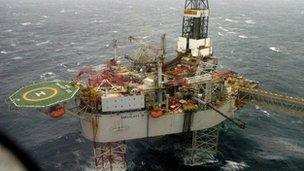North Sea wages 'rising too fast'
- Published

Some firms said recent growth and investment in the sector had been unexpected
The average wage of North Sea workers will rise by 15% from £64,000 to £73,000 over the next year, according to analysis by a recruitment firm.
The survey by Oil and Gas People said many companies were worried that wages were rising too fast and would make operations too expensive.
Respondents blamed a skills shortage in the industry for pressure on wages.
Workers in the industry said their terms and conditions were also improving.
Some 10% of the 5,000 workers surveyed said they were receiving higher pensions, 7% said they were getting more holidays and 21% more flexible working hours.
The majority - 61% - had received higher wages in the past few months.
The survey found 15% of all oil and gas workers in the North Sea will be earning more than £73,600 in 12 months time.
Drilling superintendents earn more than £105,000 per year, with drilling supervisors earning up to £85,000. The average salary for offshore installation managers is set to increase to more than £95,000 in the next 12 months.
Further down the chain, UK-based drillers will see an average salary of more than £52,000
The near-1,000 companies surveyed blamed different reasons for the skills shortage, with 32% suggesting it has been caused by too little investment in apprenticeships due to an assumption that North Sea oil was in decline.
A further 11% suggested the industry did not expect the success of new technology to pump low-grade oil, so recent growth and investment was unexpected, while 44% suggested the skills shortage in the UK had been caused by growing demand for UK staff to work abroad.
Investment 'urgent'
Kevin Forbes, of Oil and Gas People, said: "Lack of supply and increased demand for qualified staff is putting huge inflationary pressure on wages in the oil and gas industry, with industry already seeing big rises in the first quarter of 2013.
"Terms and conditions are increasing at the same time as UK oil and gas companies try to compete for a dwindling number of skilled staff. The companies are right to pinpoint the dual impact of historic lack of training and pressure from well-paid jobs abroad.
"With the record investment in North Sea oil in the last few months, this pressure on wages and skilled staff does not look likely to end any time soon.
"But there is a solution. The government needs to step in and incentivise companies to invest more in people urgently
"There is a lot of press around North Sea Oil being in decline, but the truth is there is still 30 to 40 years left in the North Sea and that estimate increases all the time as new fields are discovered and come online. Anyone looking to get into the industry now will enjoy a career that will last their lifetime easily."
Earlier this week, industry body Oil and Gas UK released its own survey, which suggested confidence among companies operating in the North Sea was increasing.
It believed tax changes introduced by the government last year to incentivise investment in the UK continental shelf were now bearing fruit.
- Published13 March 2013